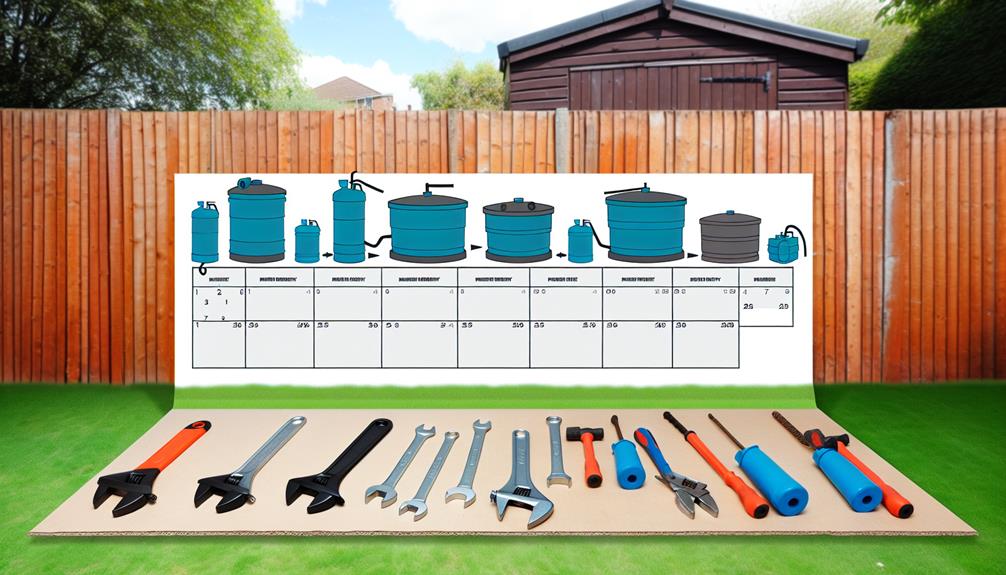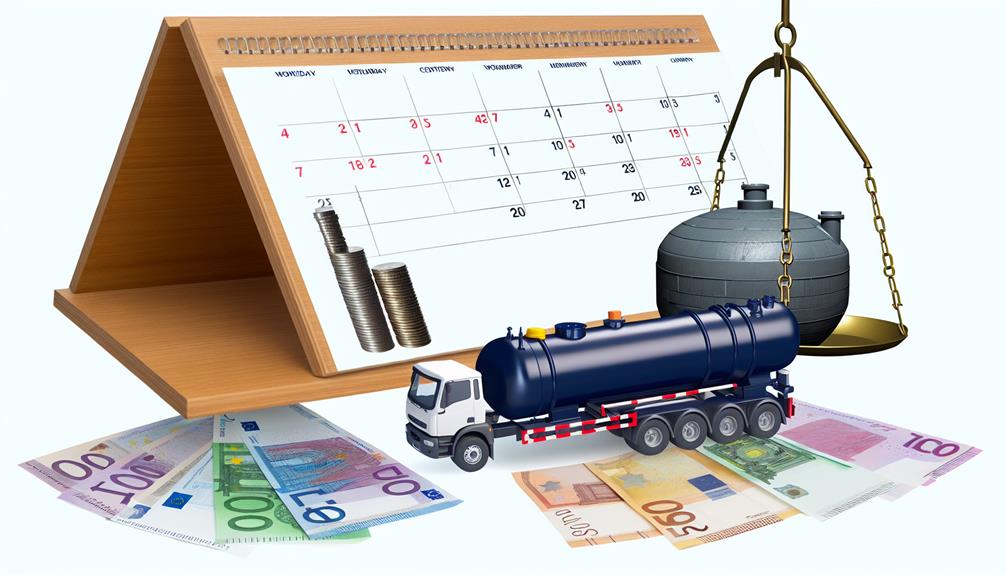Discover how to protect your septic system from breakdown with...
Read MoreYou & Your Septic Tank
Optimal Schedule for Regular Septic Tank Maintenance
Our professional septic service team offers comprehensive septic tank pumping services to keep your system running smoothly. Get a FREE Quote Today.

Optimal Schedule for Regular Septic Tank Maintenance
Let’s address the not-so-pleasant task of maintaining your septic tank. If you’re a homeowner with a septic system, there’s a delicate balance you need to maintain in order to avoid any, let’s say, unsavory situations. It’s not as simple as ‘out of sight, out of mind’, rather, it’s a crucial part of your home’s overall health.
The optimal maintenance schedule for your septic tank involves several factors, including the size of your tank, the number of people in your household, and your average water usage. While it’s generally recommended to have your septic tank inspected every 1-3 years, wouldn’t you like to know if there’s a more specific timeline that’s just right for your home?
Let’s get into it.
Key Takeaways
- Pump efficiency and tank capacity are important factors in determining the frequency of septic tank pumping.
- Regular inspections every 3-5 years can help prevent costly repairs and catch minor issues before they escalate.
- Regular septic maintenance not only prevents costly repairs but also protects health and the environment from contamination.
- Proper management of septic tank pumping costs includes setting aside a specific amount in the budget, creating an emergency fund, gathering cost comparisons, scheduling routine inspections, and understanding the services included in the quoted price.
Understanding Septic Tank Pumping Frequency

Determining the right frequency for pumping your septic tank is critical to maintain its function and longevity. There’s no one-size-fits-all answer, as the optimal pumping frequency depends on a range of factors, including pump efficiency and tank capacity.
Pump efficiency refers to how effectively your septic system’s pump moves waste from the tank into the drain field. If your pump isn’t working efficiently, it may not be able to keep up with the demand, leading to overflows and other issues. Regular maintenance can help keep your pump running smoothly and extend its lifespan.
Tank capacity, on the other hand, determines how much waste your system can handle before it needs to be pumped. If your tank’s capacity is too small for your household’s needs, you’ll need to pump it more frequently to prevent overflow.
To ensure you’re pumping at the right frequency, it’s important to get a professional assessment of your septic system. They can evaluate your pump’s efficiency and your tank’s capacity, and recommend a pumping schedule that ensures your system stays in good working order. This proactive approach can save you from costly repairs down the line.
Identifying Signs of Septic System Distress
Over time, your septic system may show signs of distress, indicating that it’s time for maintenance or repairs. Recognizing these distress indicators helps in efficient system troubleshooting, potentially saving you from costly and extensive repairs down the line.
Here are some warning signs that shouldn’t be ignored:
- Foul odors: If you’re noticing unpleasant smells around your property, particularly near the septic tank or drain field, it’s a telltale sign of system distress.
- Slow drains: Slow emptying drains throughout your house could indicate a problem with your septic system.
- Lush, green grass over the drain field: While this might seem like a good thing, it can actually be a sign that your septic tank is leaking.
- Sewage backup: This is a serious sign that your septic system is failing and requires immediate attention.
Don’t ignore these signs. If you’re experiencing any of these distress indicators, it’s time to call a professional for system troubleshooting.
Regular maintenance and inspection can prevent these issues, ensuring the longevity of your septic system.
Scheduled Inspections for Septic Tanks

To keep your septic system running smoothly, it’s essential to schedule regular inspections – ideally, every three to five years. These inspections can identify potential problems before they escalate, saving you from costly repairs and extending your septic tank lifespan.
Inspection techniques vary, but a comprehensive inspection should include checking all the components of your septic system. This means examining the tank itself, the drain field, and the associated plumbing for signs of wear, damage, or blockage. It’s not just about looking at the surface, either. Inspectors should probe the soil around your tank and drain field to detect any unseen leaks.
Don’t skimp on these inspections. They’re a critical part of septic tank maintenance, ensuring that your system continues to function as it should. Regular inspections can also catch minor issues before they become major ones, preventing system failure and helping you avoid a potential environmental disaster.
Importance of Regular Septic Maintenance
Building on the idea of scheduled inspections, consistent septic maintenance plays an integral role in preserving the health of your septic system and, ultimately, your property. It’s not just about keeping things running smoothly; it’s about ensuring septic longevity, maximizing the lifespan, and contributing to the overall value of your home.
Regular septic maintenance truly comes with a multitude of benefits. Here are a few key points to ponder:
- Prevents costly repairs: Regular maintenance can help you spot issues early, before they become major, expensive problems.
- Preserves property value: A well-maintained septic system boosts your property’s value and appeal.
- Protects your health and the environment: Inefficient septic systems can contaminate groundwater, posing a risk to your family’s health and the surrounding ecosystem.
- Peace of mind: With regular maintenance, you won’t have to worry about unexpected system failures.
Maintenance benefits are clear. Regular checks and upkeep not only extend your system’s life but also ensure optimum performance. While it might seem like an added expense now, in the long run, you’ll find it’s a cost-saving measure, safeguarding your investment in your home.
Managing Septic Tank Pumping Costs

Understanding how to manage your septic tank pumping costs can significantly lessen the financial burden associated with maintaining your system. As part of this process, you’ll need to adopt effective budgeting strategies.
Firstly, set aside a specific amount for septic services in your monthly budget. This way, you’re not caught off guard when the need for pumping arises. Additionally, creating an emergency fund for unexpected septic issues can be a lifesaver.
Next, it’s wise to gather cost comparisons from various service providers in your area. Prices can vary widely, so shopping around is key. Keep in mind that the lowest price doesn’t necessarily guarantee the best service. Look for a balance between cost and quality of service.
Regular maintenance can also help control costs. By scheduling routine inspections, you can detect and address minor issues before they turn into major, costly repairs. Always remember that prevention is cheaper than cure.
Lastly, be sure to understand what services are included in the quoted price. Some companies may charge extra for disposal of the waste or even the digging required to access your tank.
Frequently Asked Questions
What Are the Environmental Impacts of Not Maintaining a Septic Tank Properly?
If you don’t maintain your septic tank properly, it can become a source of contamination, posing serious health risks. Leaking waste can pollute water sources, harming local wildlife and potentially affecting human health.
How Does the Size of My Household Affect the Maintenance Schedule of My Septic Tank?
The size of your household impacts your septic tank’s maintenance schedule significantly. More people mean more waste, necessitating frequent Household Waste Management and Tank Capacity Evaluation. You’ll need more regular inspections and potential pump-outs.
Can I Use Any Cleaning Products if I Have a Septic Tank?
Sure, you can use cleaning products, but be picky. Your product selection should focus on ‘septic safe’ items. They won’t disrupt the essential bacterial balance in your tank, keeping it functioning optimally.
Are There Any Specific Regulations or Permits Needed for Septic Tank Maintenance?
Yes, there are. You’ll need to ensure regulatory compliance and possibly obtain permits for septic tank maintenance. It’s best to check with your local health department or environmental agency for specific rules and regulations.
How Do Seasonal Changes or Weather Conditions Affect My Septic Tank’s Performance?
Seasonal changes greatly impact your septic tank’s performance. Lower temperatures can slow material breakdown, while extreme heat might speed it up. You’ll need to adjust maintenance accordingly to ensure optimal function.
Conclusion
In all seriousness, your septic tank could be on the brink of throwing the world’s smelliest party if you ignore regular maintenance. Don’t be the unsuspecting host of this stinky soiree!
Regular check-ups, noticing warning signs, and strategic pumping can save your wallet from a hefty hit.
Remember, a well-maintained septic system isn’t just crucial—it’s your knight in shining armor, guarding your home from disaster.
Don’t underestimate your septic system; it’s the unsung hero of your household.
You may also like...
Why Are DIY Fixes Essential for Septic Tank Pumping?
Tap into the importance of DIY fixes for septic tank...
Read MoreUnveiling the Average Costs of Septic Tank Pumping
Master the mysteries of septic tank pumping costs and avoid...
Read More
The Best Septic Tank Pumping Services Near You

Answer Some Questions
Let us know about your needs so we can find you the right septic tank pros.

Get Quotes
We will put you in touch with the right septic tank pros for your job and location.

Hire Right
Compare quotes, message or call pros, and hire only when ready.



